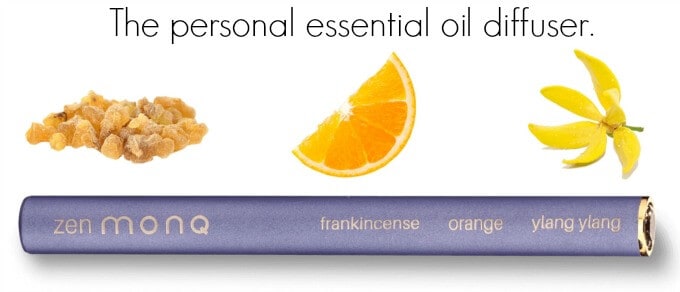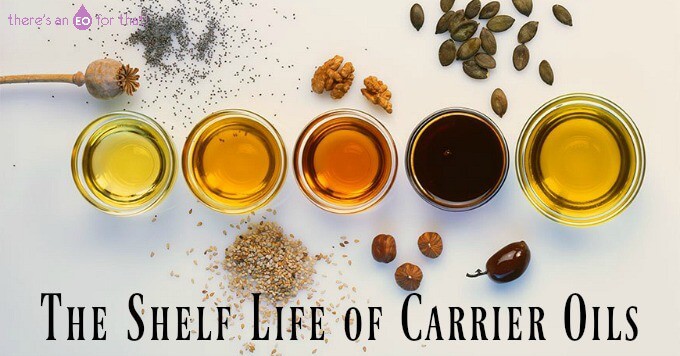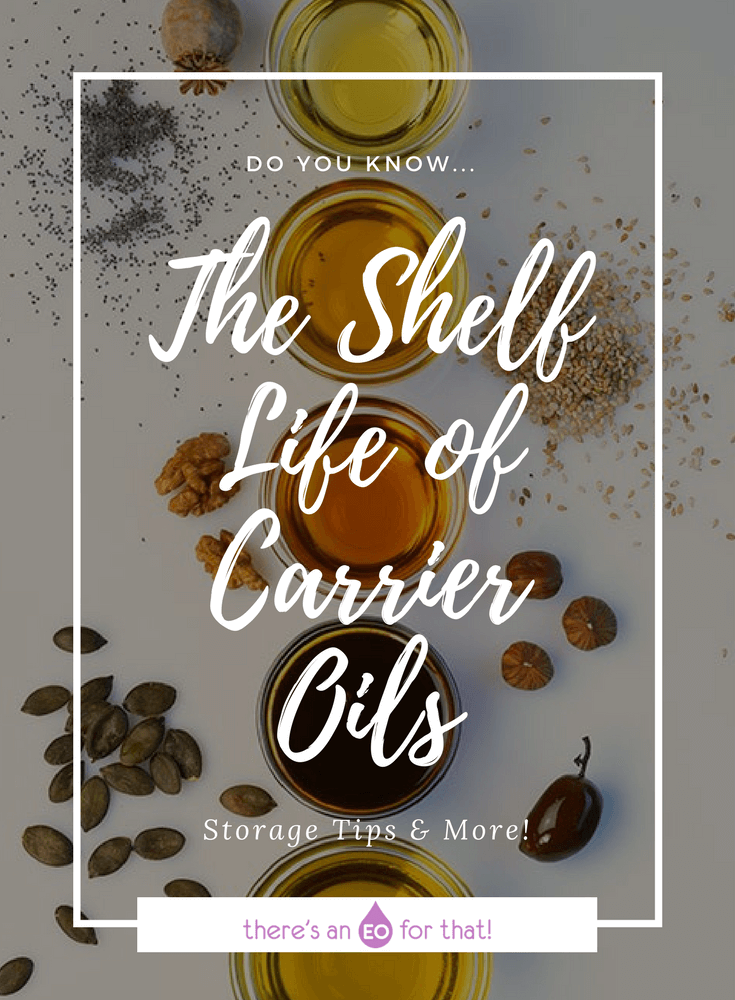Trying out new carrier oils is something I really enjoy, but what I don’t enjoy is having them go rancid before I’ve had the chance to really experience all the oil has to offer. This seems to be a common issue, especially if you’re trying to find the right oil for you skin type or its specific needs.
All too often we forget that we have half a bottle of beautiful carrier oil before moving on to the next only to rediscover it later and find that it’s gone off.
It you have ever experienced the “old crayon” scent or tacky texture, you know what I mean, and it’s such a tragedy when you lose an old favorite to oxidation.
To hopefully help remedy this sad situation, I’ve gone ahead and collected as many carrier oils as I could and their shelf life so that you can keep track.
Of course, the shelf life of any given oil will largely depend on how it’s treated and stored, but if well taken care of, a carrier oil can be used to its full extent.
The Shelf Life of Carrier Oils and How to Extend it!
Before we dive into the oils, I want to first go over a few very important tips on how to extend the shelf life of carrier oils in general.
1. Store them in a cool dark place
This is one of the most important steps to follow if you want your carrier oils to stay fresh. UV rays from direct sunlight will very quickly begin to break down an oil and cause it to rancid much more quickly. Heat should also be avoided as it will speed up oxidation and turn your oils.
Store carrier oils in a cool dark cupboard to keep them away from any type of heat and sunlight. Keeping them in dark bottles is another good way to store them.
2. Store them in smaller bottles
This can be a bit tricky if you don’t have different sized bottles, but if possible, it is best to store carrier oils in the smallest bottle possible as they are used. This is because oxygen oxidizes the oil. The more air the bottle contains the faster the carrier oil can go rancid.
If you have just 2 oz left of carrier oil stored in an 8oz bottle, you may want to see about transferring it into an actual 2oz bottle to help it stay fresh longer, especially if it’s an oil you don’t tend to use often.
3. Make sure they’re capped tightly closed
If oxygen can get into the storage bottle via a loose-fitting cap, your carrier oils will go rancid more quickly.
This happens because polyunsaturated oils like avocado, chia seed, grapeseed, sesame, and safflower oil all contain carbon chains where the hydrogen atoms are absent and oxygen atoms can attach. When oxygen attaches, oxidation occurs and causes the carrier oil to go rancid.
Simply keep all caps tightly closed to prevent this from happening.
Of course, you may notice that some oils go rancid faster than others and that can be due to a number of factors like how long the polyunstaturated chain is within the oil, whether it’s considered a saturated or monosaturated oil, if it’s a fixed oil, and its antioxidant content.
4. Store them in the fridge
The best way to extend the shelf life of carrier oils is to store them in the fridge. It’s much colder and there’s no sunlight which are two major factors that contribute to rancidity.
Storing your carrier oils the fridge can extend the life of carrier oils by as much as 1 year!
5. Keep them clean
When using your carrier oils, make sure you’re not getting any water, moisture (this tends to happen when using fresh herbs during infusion), or impurities in them.
Using unwashed utensils or pouring any unused carrier oil back into its original container is a sure way to speed up rancidity.
Everything that touched the oil should be as clean and dry as possible to prevent oxidation or any kind of germs from growing in it.
As long as you control the temperature, cleanliness, light exposure, and air exposure your oils should last to the full extent of their shelf life.
Why Does This Matter?
Carrier oils, just like essential oils, each have their own benefits and properties they can lend to our recipes. If you mistreat them, they will lose their potency and usability which sort of defeats the purpose of using high-quality carrier oils, especially the fancier ones.
Even adding fresh perfectly potent essential oils to a carrier oil that has turned isn’t going to save it.. If nothing else, you will just smell like turned oil with a bit of fragance added. Not very nice if you ask me!
So, do yourself a favor and keep your carrier oils properly cared for so that you may enjoy them throughout their shelf life.
The Shelf Life of Carrier Oils
All of these are listed in alphabetical order for easy use!
Also, remember that these are general guidelines and that the packaging for these oils may say something different than I list below.
If you’re interested in the comedogenic rating of 80+ different carrier oils and their benefits, check out my post on the topic HERE.
Almond Oil (unrefined) – 1 year
Almond Oil (refined, expeller pressed) – 1 year
Aloe Vera Oil – 6 months – 1 year
Amla Oil – 1-2 years
Apricot Kernel Oil (cold pressed) – 1 year
Apricot Kernel Oil (expeller pressed) – 1 year
Argan Oil (cold pressed/unrefined) – 2+ years
Avocado Oil (cold pressed/unrefined) – 1 year
Avocado Oil (refined) – 1.5 years
Babbasu Oil – 2 years
Babchi Oil – 1 year
Baobab Oil – 2 years
Blackberry Seed Oil – 6 months – 1 year
Black Currant Seed Oil – 6 months – 1 year
Black Raspberry Seed Oil – 1 year
Black Seed Oil – 6 months – 1 year
Blueberry Seed Oil – 1 year
Borage Oil – 6 months (may go rancid more quickly if not refrigerated)
Brahmi Oil – 1-2 years
Brazil Nut Oil – 2 years
Broccoli Seed Oil – 1 year
Calendula Oil (infused) – 1 year
Camelina Oil (sativa) – 2 years
Camelina Oil (sinensis) – 2 years
Camellia Oil – 2 years
Carrot Seed Oil (cold pressed) – 1 year
Castor Oil (cold pressed) – 5 years
Chardonnay Grape Seed Oil (cold pressed) – 1 year
Cherry Kernel Oil – 1 year
Chia Seed Oil (cold pressed) – 2 years
Coconut Oil (cold pressed/unrefined) – 2-4 years
Coconut Oil (refined) – 2-4 years
Cranberry Seed Oil – 2 years
Emu Oil – 1 year (refrigerated)
Evening Primrose Oil (cold pressed) – 6 months – 1 year
Flax Seed Oil – 6 months (refrigerated)
Fractionated Coconut Oil – 5+ years
Grapeseed Oil (cold pressed) – 1 year
Hazelnut Oil (cold pressed) – 1 year
Hazelnut Oil (refined) – 1 year
Hemp Seed Oil (cold pressed) – 1 year (refrigerated)
Hypericum Oil (St John’s Wort – infused) – 1 year
Jojoba Oil (refined) – 5 years
Jojoba Oil (cold pressed) – 5 years
Karanja Oil (expeller pressed) – 2 years
Kiwi Seed Oil – 1 year (refrigerated)
Kukui Nut Oil (cold pressed) – 1 year
Macadamia Nut Oil (cold pressed) – 1 year
Malkangni Oil (cold pressed) – 2+ years
Mango Seed Oil (cold pressed) – 1-2 years
Marula Oil (cold pressed) – 2 years
Meadowfoam Oil – 5 years
Moringa Seed Oil – 1+ years
Muskmelon Seed Oil (cold pressed) – 2+ years
Neem Oil (cold pressed/unrefined) – 2 years
Olive Oil Pomace – 2 years
Olive Oil (cold pressed/unrefined) – 2 years
Palm Oil (Red – unrefined) – 2 years
Papaya Seed Oil (cold pressed) – 1 year
Parsley Seed Oil – 1 year
Passion Fruit Seed Oil (Maracuja Oil – cold pressed) – 1-2 years
Peach Kernel Oil (cold pressed/unrefined) – 1 year
Pecan Nut Oil (cold pressed/unrefined) – 1 year
Perilla Seed Oil (cold pressed) – 1-2 years
Pistachio Nut Oil (cold pressed/unrefined) – 6 months – 1 year
Plum Kernel Oil – 1 year
Pomegranate Seed Oil – 1 year
Poppy Seed Oil – 1 year
Pumpkin Seed Oil (cold pressed/unrefined) – 1 year
Praxaci Seed Oil – 1 year
Prickly Pear Seed Oil – 2 years
Red Raspberry Seed Oil – 2 years
Rice Bran Oil (cold pressed) – 1 year
Rose Hip Seed Oil – 6 months (refrigerated)
Safflower Seed Oil (high linoleic) – 2 years
Safflower Seed Oil (high oleic) – 2 years
Seabuckthorne Berry Oil (CO2) – 1 year
Seabuckthorne Seed Oil (CO2) – 1 year
Seabuckthorne Berry Oil (cold pressed) – 1 year
Sesame Oil (cold pressed) – 1 year
Shea Oil – 1 year
Soybeal Oil (refined) – 1 year
Squalane Oil – 2 years
Strawberry Seed Oil (cold pressed) – 2 years
Sunflower Seed Oil (cold pressed/unrefined) – 1 year
Tamanu Oil (cold pressed/unrefined) – 1 year
Walnut Oil (unrefined) – 2 years
Watermelon Seed Oil (cold pressed/unrefined) – 2 years
Wheat Germ Oil (unrefined) – 1 year
So there you have it! The shelf life of common (and not-so-common) carrier oils. have you used any of these before? How have you kept them fresh?
You may also enjoy reading:
The Complete List of Comedogenic Oils
The Comedogenic Rating of 300+ Skincare Ingredients
Beginners Guide to Essential Oils- Part 1
 This post contains affiliate links. We are a participant in the Amazon Services LLC Associates Program, an affiliate advertising program designed to provide a means for us to earn fees by linking to Amazon.com and affiliated sites. Please read my full disclosure and disclaimer.
This post contains affiliate links. We are a participant in the Amazon Services LLC Associates Program, an affiliate advertising program designed to provide a means for us to earn fees by linking to Amazon.com and affiliated sites. Please read my full disclosure and disclaimer. 


Hey lovely
Informative helpful in choosing the right oil for my natural products.
Please can you tell me, if I where to infuse cinnamon or vanilla pods in an oil, and heat it up. Does the heating affect the shelf life? I need it in a product of mine and not too sure on how to go about preserving the lovely oil.
I can not use it if it will last only 2 months!
Is there anything productive I can do with a carrier oil that has gone rancid? Surely something needs lubricating?
What is the shelf life for Laurel Berry?
Hello and thank you for this very informative collection of shelf life of carrier oils. One question. Are these dates for opened bottles or from never been opened.
Thanks again,
William
Thank you for your wonderful and informative column. I am in school to become a Certified Master Aromatherapist. I am always looking for ways to extend the life of a blend in a carrier oil. Does adding Vitamin E also help?
Which oil would you recommend for a sugar scrub
Alma
Argan
Babbasu
Jojoba refined or coldpressed
Coconut Oil
or Olive oil
The oil should absorb and not feel greasy
I love Kukui Nut Oil but I am worried about the One Years Shelf Life.
Thank you
Any tips for travelling with oils that require refrigeration? I’ve been using hemp seed oil on my face for a few months now and my skin is fantastic. I travel a decent amount though (especially over the holidays) and I’d love to keep up the routine. I read somewhere that there are special bottles that help keep them from going rancid, but a) I wasn’t sure if that was true and b) I can’t remember what type of bottle it was!
Hi Joselyn!
How long will you be traveling? Often, hotel rooms will have a small fridge you can use and if not, you can request one! I have travelled with hemp oil unrefrigerated for about a week without any noticeable difference 🙂
The glass you may be thinking of is miron glass?
Why are some of these oils crossed out?
Wierd!
For some reason the underline for the links are higher than normal for some of these…very strange! They aren’t supposed to look like this. Thanks for letting me know, but I don’t know how to fix the issue 🙁
Check the html. Copy it from the good lines and see how it’s different from the other ones.
I think I got it fixed 🙂 It was a plugin causing all the issues!